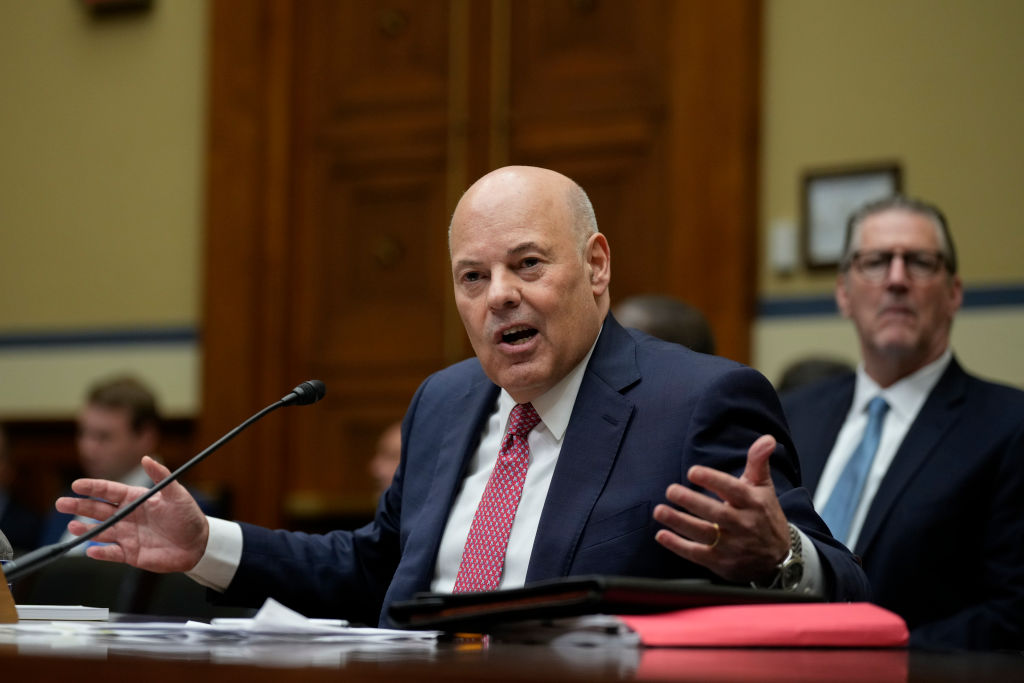
For the first time in more than two years, Postmaster General Louis DeJoy returned to Capitol Hill on Tuesday, where lawmakers pressed him on how he was combating the growing trend of mail-related crimes, including check theft and assaults on postal workers.
Speaking at a House Oversight Committee hearing, DeJoy said this was the issue he receives the “largest number of phone calls” about, as he laid out his plan for ramped-up security measures against check robberies and fraud. “Any axis to our system is a target that we need to defend against,” he said.
The initiatives include adding new locks on mailboxes nationwide, incorporating a double-validation key system for letter carriers, thereby making it harder for criminals to break into mailboxes, and hardening the physical infrastructure of standalone blue collection boxes and cluster mailboxes. “Some of these, they take chainsaws to,” DeJoy told the panel. “It’s pretty deliberate.”
Rep. Kweisi Mfume, a Democrat who represents inner-city Baltimore, said his district had some of the worst mail delivery rates nationwide during the pandemic, but that there have been improvements since then. Today, he hears more from constituents about a different postal complaint. “Now that mail delivery is getting better, the 7th district and other parts of Maryland are the victims of mail theft,” he said.
More from TIME
It’s a problem that has been getting worse over the last several years. The Postal Inspection Service has said it received roughly 300,000 complaints about mail theft from March 2020 through February 2021. That was more than double the number from a year earlier, when the nation was still gripped in the pandemic. Checks in particular are stolen from the mail at high rates. Last year, U.S. banks filed roughly 680,000 check-fraud reports, according to data from an enforcement division of the Treasury Department. That is nearly double the amount of such reports filed in 2021.
The postal chief emphasized how such crime marked a disruption to the USPS’s business model. “Our success is the ability of people to conduct commerce through the Postal Service, and crime, throughout history, has always been a deterrent to commerce,” DeJoy said. “It will take a couple years before it gets to a place where you and I will be happy about it.”
Lawmakers also focused on a matter not just hurting consumers but the USPS workforce as well. More than 2,000 postal workers have been assaulted or robbed since 2020, according to Postal Service data, with 305 having been targeted in the first quarter of this year.
Rep. Jamie Raskin, a Democrat of Maryland and the ranking member of the committee, said DeJoy’s plan for addressing mail-related crime was “light on proactive protection for letter carriers.” He asked whether DeJoy could allow for postal police officers to expand their presence from beyond the physical facilities of post offices to protect carriers going into high-crime areas. DeJoy said he lacked the statutory authority to dispatch those officers elsewhere, and added that even if he did, he didn’t have enough at his disposal to make a large enough impact.
“If I had 60,000, I would come to you and ask for the authority to do what you are asking us to do,” DeJoy said. “I don’t. I have 600.”
The Trump-era Postmaster General received a generally warmer welcome from Democrats than on previous visits to Congress. Multiple members thanked him for his role in helping last year to pass the Postal Service Reform Act, landmark legislation that codified six-day delivery into law and ended a federal mandate that the USPS pre-pay the health plans for retirees, an onerous requirement imposed on no other federal agency. Others gave him credit for the Postal Service’s success handling midterm election mail—99% of all of 2022 mail ballots were delivered within three days.
Read more: Louis DeJoy on USPS, Trump, and His Surprising Second Act
Mfume, who said he was concerned that 650,000 ballots out of 54 million weren’t returned on time, later credited DeJoy for overseeing “some sense of progress” as a whole.
There are still more headwinds for DeJoy to navigate. While the agency has reduced projected losses from $160 billion to $70 billion over the next 10 years, inflationary pressures have added $3 billion in additional costs over the last two years, crippling its ability to break even in 2023, according to DeJoy. “We will be taking more aggressive actions to get back on track,” he said last week.
Part of his plan to address the shortfall is already in motion. The agency is working to eliminate hundreds of processing centers and consolidate them into 60 regional processing facilities. On Tuesday, DeJoy also floated ideas such as rethinking some post offices to create shared workspaces with small businesses and creating other partnerships with private companies.
“We’re going to chase after this stuff,” he said.
More Must-Reads From TIME
- The 100 Most Influential People of 2024
- Coco Gauff Is Playing for Herself Now
- Scenes From Pro-Palestinian Encampments Across U.S. Universities
- 6 Compliments That Land Every Time
- If You're Dating Right Now , You're Brave: Column
- The AI That Could Heal a Divided Internet
- Fallout Is a Brilliant Model for the Future of Video Game Adaptations
- Want Weekly Recs on What to Watch, Read, and More? Sign Up for Worth Your Time
Contact us at letters@time.com